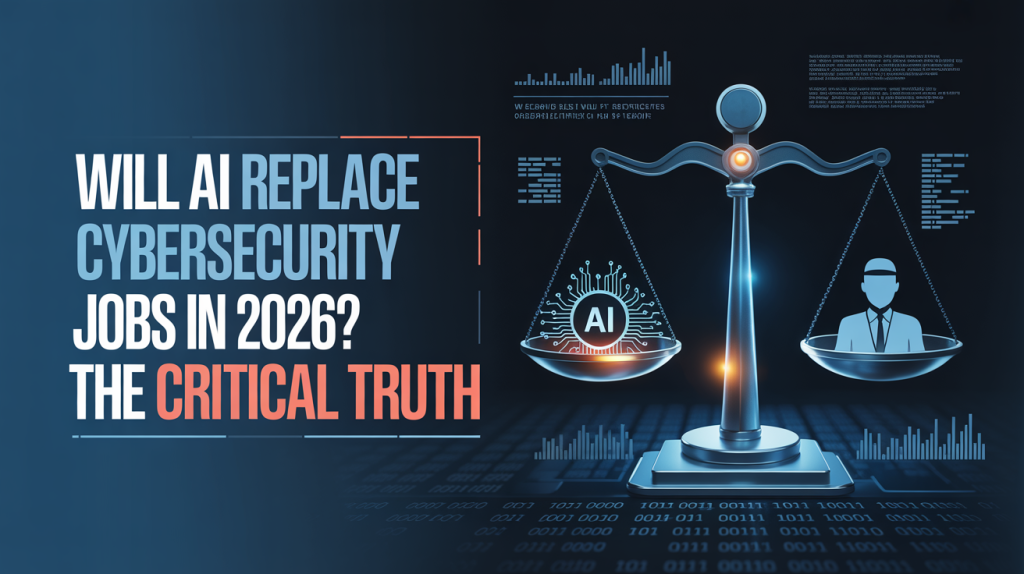Will AI will replace cybersecurity jobs in 2026? This is the question everyone is asking across cybersecurity circles.
Let’s discuss it. AI isn’t here to steal your cybersecurity badge, but it will for sure redefine your role. At this point, one fundamental aspect is to actually accept the fact that AI has reshaped the cybersecurity industry, and those who agree and adapt to using AI will outperform the rest. Those who don’t? They will face the consequences of their tasks being automated and be sidelined.
So, where do we stand in 2026 as the new wave of machine intelligence continues to reach new shores? Will AI replace cybersecurity jobs in 2026?
AI in Cybersecurity Is Reshaping, Not Replacing Jobs

AI in cybersecurity is already performing many of the tasks once seen as high-skill, such as:
- Log analysis and anomaly detection
- Malware classification
- Threat intelligence correlation
- Incident triage and prioritization
But here’s the truth: AI still struggles with understanding context, unpredictability, and intent. It’s really good at spotting patterns, yet very bad, quite often, at understanding why those patterns matter. In other words, it can see what’s happening, but not why that matters.
That’s exactly where cybersecurity professionals continue to have the edge over the tools. Interpreting risk, making judgment calls, and designing systems that balance both security and usability. Therefore, will AI replace cybersecurity jobs? Most probably, not.
In short, humans handle sense. AI, speed.
Case A: The Analyst Who Didn’t Adapt
Let’s meet Marco, a mid-level SOC analyst who’s been working the same way since 2020.
He ignores the AI tools his company rolls out, sticks to manual log reviews, and keeps dismissing new language model integrations as “hype.” By late 2026, his workload is overtaken by an automated threat detection pipeline that never sleeps.
When company restructuring comes, Marco’s team needs fewer analysts and his name ends up on the layoff list.
Lesson: Standing still in a fast-moving tech landscape is as risky as leaving an exposed port open. Analysts who ignore these advancements risk watching AI replace cybersecurity roles like theirs.
Case B: The Professional Who Adapted to AI in Cybersecurity
Now meet Rina, also a cybersecurity analyst, but she took a different path.
She learned how to train and tune AI models for threat detection, experimented with Python automation, and kept herself busy learning new things and experimenting with tools.
Instead of competing with AI, she built workflows that combined data-driven insights with her own threat modeling expertise. She now leads a small team overseeing hybrid AI-human threat response systems.
Rina didn’t fear AI, she leveraged it.
By 2026, her role evolved into something more strategic and resilient than ever before.
What’s Changing in Cybersecurity Jobs and Roles with AI in 2026

Here’s what professionals can realistically expect in 2026:
- AI-assisted SOC operations will become the norm, not the exception. Expect automated triage, smarter alert correlation, and faster incident response.
- Red teaming will become even more creative, as adversarial AI tools are tested against defenses.
- Career roles will shift from “manual execution” to “machine collaboration.” You’ll spend less time collecting logs and more time interpreting the story behind them.
- Upskilling pressure will intensify. Professionals with AI fluency and good at prompt engineering, even perhaps at a basic level, will edge ahead in hiring and salary discussions.
Cybersecurity leaders, according to The United States Cybersecurity Institute predict that by 2026, the most significant cybersecurity trends will include widespread AI automation, advanced predictive analytics, and creative red teaming, highlighting the key roles new technologies will play in shaping SOC operations.
How to Secure Your Career in the AI Era
Think of AI as an amplifier. It amplifies productivity, insight, and… gaps in skill. If you’re proactive, it enhances your value. If not, it exposes your stagnation.
Here’s how to make sure you’re in the first category:
- Learn AI basics: Understand how models analyze data, detect anomalies, and generate responses.
- Automate small tasks: Write Python scripts to streamline your analysis or integrate open-source AI tools like VirusTotal Intelligence or MISP with GPT connectors.
- Focus on human strengths: Develop skills in contextual reasoning, ethical decision-making, and cross-department collaboration.
- Stay adaptable: Cybersecurity evolves every six months; assume your toolkit will too.
- Engage with AI communities: Visibility and shared learning keep you relevant and informed.
Wrapping Up
By the end of 2026, the cybersecurity jobs won’t be “replaced” — they’ll be rebalanced. AI will take the repetitive, data-heavy tasks off the table, giving professionals more room for strategic impact. So, the next time someone asks will AI replace cybersecurity jobs, it’s not about replacement, but reinvention. Cybersecurity impacts business success and it’s instrumental to adapt to AI in cybersecurity.
Your real competition isn’t AI itself, it’s your own unwillingness to evolve. The question isn’t whether AI will replace cybersecurity roles, but how those roles will evolve.
So take this transition personally. Stay curious. Learn continuously. Blend technical precision with adaptive thinking. Professionals who understand the role of AI in cybersecurity will remain indispensable. In doing so, you won’t just survive the AI revolution in cybersecurity — you’ll lead it.



